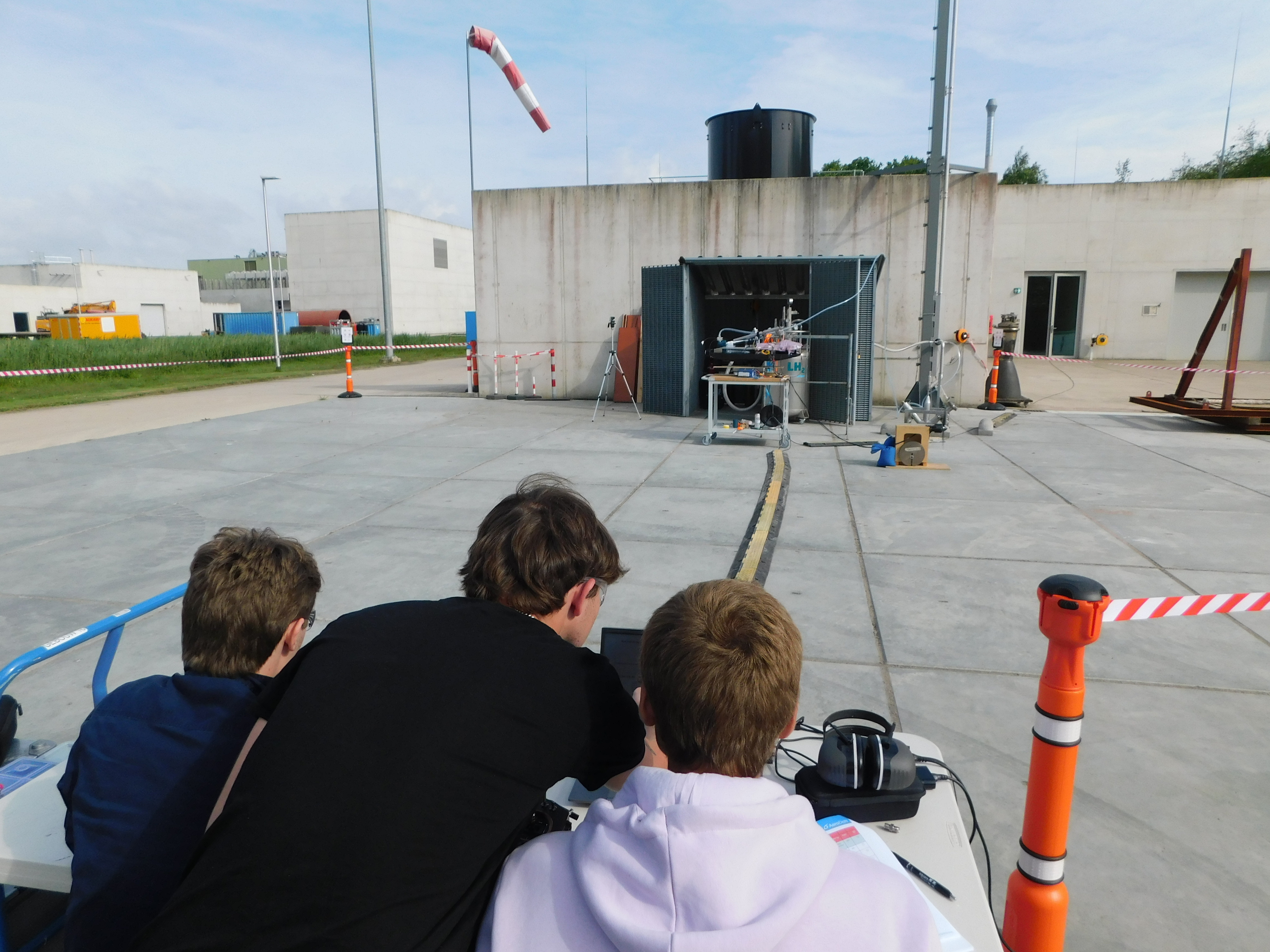AeroDelft First Student Team to Test Liquid Hydrogen Aircraft Propulsion System
AeroDelft, a fully student-run and student-owned non-profit foundation based in Delft, has become the first student team in the world to design, build, and test an electric aircraft propulsion system (powertrain) using liquid hydrogen as its energy source. The successful test was conducted in collaboration with TNO at their liquid hydrogen facility in Ypenburg, The Hague. It marks a significant milestone in the team’s mission to prove and promote liquid hydrogen as a viable and sustainable alternative to conventional aviation fuels.
Working with liquid hydrogen presents unique technical and logistical challenges. It must be stored at -253 °C and conditioned to room temperature before entering the fuel cell, which combines hydrogen and oxygen to produce electricity, with water as its only byproduct. This combines the hazards of cryogenics with the flammability and volatility of hydrogen gas. To address this, AeroDelft developed a vacuum-insulated tank, co-designed with Cryoworld, and a custom-built electric heat exchanger capable of handling a 300 °C temperature gradient. The entire system is operable from distance, includes dedicated venting and safety redundancies, and was integrated in collaboration with TNO and liquid hydrogen supplier Air Products. Navigating strict safety regulations and coordinating across partners, the team designed and tested the system using liquid nitrogen and gaseous hydrogen before successfully validating it with liquid hydrogen.
Since 2018, AeroDelft has been working on Project Phoenix, an initiative to develop a manned liquid hydrogen-powered electric aircraft. The team has already flown a battery-electric drone and completed testing with gaseous hydrogen. While both approaches are sustainable and widely adopted in ground transport, they fall short of meeting the performance demands of aviation. Liquid hydrogen, with its superior energy density by mass and volume, offers a more competitive alternative—though it presents significant technical, logistical, and safety challenges.
Davide Mangini, Chief of Liquid Hydrogen Propulsion
“Watching the propeller spin—powered by a liquid hydrogen system we spent years designing—was one of the most powerful moments of my life. All the pressure, all the late nights, came down to that single visual confirmation: it works. And we made it work, together.”
Wadeke Tieleman, Team Manager
“This test shows what’s possible when students take full ownership of a mission they believe in. Everyone on this team shares a commitment to sustainable aviation—and now, they’re also among the most experienced students in the world when it comes to working with hydrogen, allowing them to continue driving innovation after their studies. That’s something we’re incredibly proud of.”
With this successful test, AeroDelft became the first student team to run an electric powertrain on liquid hydrogen, marking a significant milestone on the road to sustainable aviation. The team will now analyze the data collected, refine the full-scale system, and continue preparations for the first manned test flight of its liquid hydrogen-powered fuel cell electric aircraft.
About AeroDelft
Founded in 2018, AeroDelft is a student-owned and student-run non-profit based in Delft, Netherlands, comprising over 60 students from a wide range of educational backgrounds and nationalities. The team is dedicated to accelerating sustainable aviation by developing hydrogen-powered aircraft, including the Phoenix Prototype and the Full-Scale Phoenix. AeroDelft is currently testing its full-scale powertrain with gaseous hydrogen, alongside liquid hydrogen testing on its scaled-down prototype. The Full-Scale Phoenix, a manned hydrogen fuel cell-electric aircraft, is being developed with the ambition to fly on gaseous hydrogen in 2025 and on liquid hydrogen in 2026.
Tamás Dávid Farkas
AeroDelft
+31 6 53560646
tamas.farkas@aerodelft.nl
Visit us on social media:
LinkedIn
Instagram
YouTube
Legal Disclaimer:
EIN Presswire provides this news content "as is" without warranty of any kind. We do not accept any responsibility or liability for the accuracy, content, images, videos, licenses, completeness, legality, or reliability of the information contained in this article. If you have any complaints or copyright issues related to this article, kindly contact the author above.
The DAFT Visa Revolution: Thousands of Americans Relocate to the Netherlands Amid Political Turbulence
SXTC-DYADICA Releases Groundbreaking White Paper on AI 5.0: The Future of Brand-Driven Artificial Intelligence
US Firm Neuworldz Gaining Industry Buzz for Spotlighting Visionaries Driving Global Impact Across Industries
Więcej ważnych informacji
 Jedynka Newserii
Jedynka Newserii

 Jedynka Newserii
Jedynka Newserii

Handel

Komisja Europejska chce wprowadzić ujednolicone przepisy dotyczące wyrobów tytoniowych. Europosłowie mówią o kolejnej nadregulacji
Ministerstwo Zdrowia opracowało nowy projekt przepisów wprowadzających kolejne zakazy dotyczące wyrobów tytoniowych – całkowitą eliminację e-papierosów oraz zakaz aromatów w woreczkach nikotynowych. Najprawdopodobniej w ciągu kolejnych dwóch–trzech lat Polska będzie musiała implementować nową dyrektywę dotyczącą wszystkich produktów tytoniowych, nad którym niebawem ma rozpocząć prace Komisja Europejska. Europosłowie mówią o ryzyku chaosu legislacyjnego, nadregulacji i wskazują na zagrożenia związane z proponowaną podwyżką akcyzy.
Konsument
Za trzy miesiące ruszy w Polsce system kaucyjny. Wątpliwości budzą kwestie rozliczeń i podatków

Zaledwie trzy miesiące zostały do startu systemu kaucyjnego w Polsce. Kaucje obejmą szklane i plastikowe butelki oraz puszki z napojami. To duża zmiana dla producentów napojów, sklepów i konsumentów oraz pośredniczących w zbiórce operatorów systemów kaucyjnego. Na razie przepisy są na tyle niedoprecyzowane, że budzą wiele wątpliwości w kwestii rozliczania podatków czy rozliczeń z operatorami. Producenci będą musieli płacić podatek od niezwróconych butelek, co zwiększy ich koszty.
Transport
Rośnie skala agresji na polskich drogach. Problemem jest nie tylko nadmierna prędkość, ale też jazda na zderzaku

Za kilka dni zaczynają się wakacje, czyli statystycznie najniebezpieczniejszy czas na drogach. Wśród głównych przyczyn takich zdarzeń na prostych odcinkach drogi są nadmierna prędkość i jazda na zderzaku. Zarządca autostrady A4 Katowice–Kraków w ramach kampanii „Nie zderzakuj. Posłuchaj. Jedź bezpiecznie” zwraca uwagę na zjawisko agresji na polskich drogach i przypomina, że bezpieczeństwo zaczyna się od osobistych decyzji kierowcy.
Partner serwisu
Szkolenia

Akademia Newserii
Akademia Newserii to projekt, w ramach którego najlepsi polscy dziennikarze biznesowi, giełdowi oraz lifestylowi, a także szkoleniowcy z wieloletnim doświadczeniem dzielą się swoją wiedzą nt. pracy z mediami.












.gif)

 |
| |
| |
|